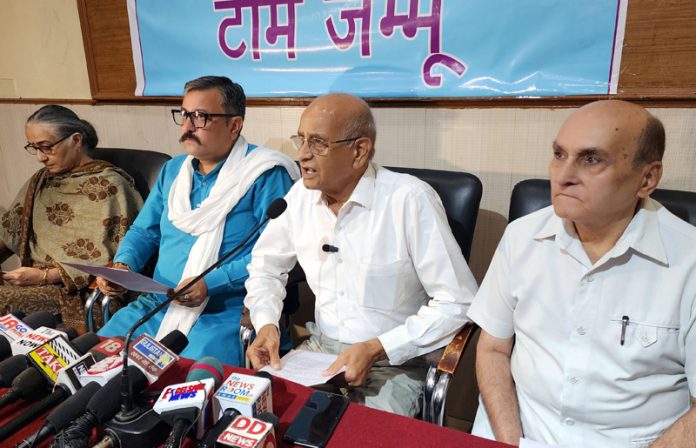
Excelsior Correspondent
JAMMU, Aug 4: Dogri Sanstha Jammu and Team Jammu have jointly demanded the rescinding and modification of a recent Government notification that allocated only one position for a Dogri teacher out of 748 advertised positions for temporary teachers across various subjects. The groups argue that this allocation undermines the importance of Dogri in the school education system.
Click here to watch video
The issue was highlighted in a press conference addressed by Prof Lalit Magotra (president of Dogri Sanstha) and Zoravar Singh Jamwal (Chairperson of Team Jammu). They were joined by Inderjeet Kesar and Prof Shashi Pathania (vice presidents of Dogri Sanstha Jammu), along with several Team Jammu members and Dogri writers.
Prof Magotra expressed disappointment over the Government’s apparent neglect of Dogri, despite its recognition as an official language of Jammu & Kashmir following the Lok Sabha bill dated September 22, 2020. Prof Magotra emphasized that it is the responsibility of J&K officials to support and promote Dogri as mandated by the Government policy.
He pointed out the severe shortage of Dogri teachers in higher secondary schools, with only six regular Dogri teachers in over 400 schools in the Jammu zone, while 24 positions remain vacant. The recent allocation of just one temporary Dogri teacher further exacerbates the issue. Prof Magotra also noted the supportive stance of the LG towards promoting art and culture, suggesting that bureaucrats may not be adequately apprising him of these concerns.
Zoravar Singh Jamwal warned that the lack of sufficient Dogri teacher positions at the school level could harm the language’s growth and limit employment opportunities for young scholars with advanced degrees in Dogri. He added that this policy could reduce the number of students studying Dogri, ultimately impacting the availability of Dogri teachers in colleges and threatening the language’s overall development.

